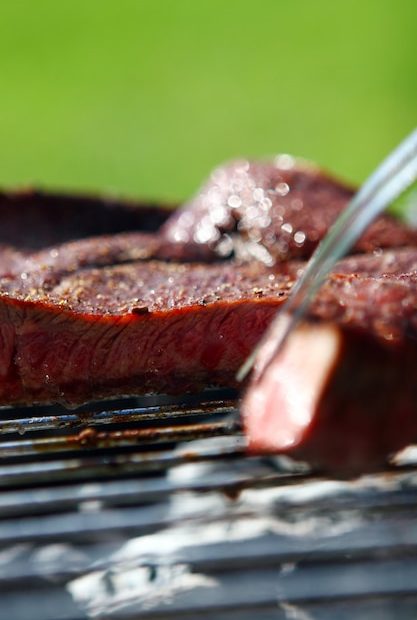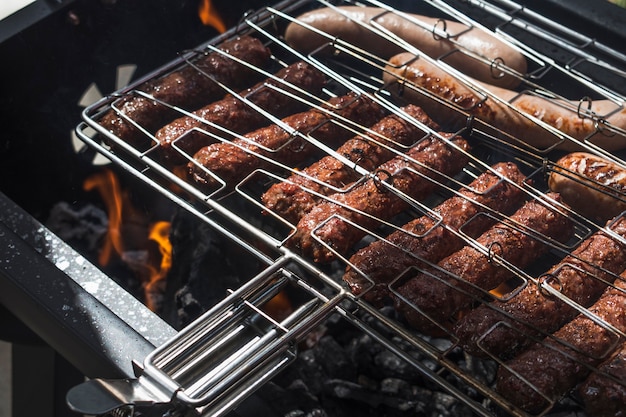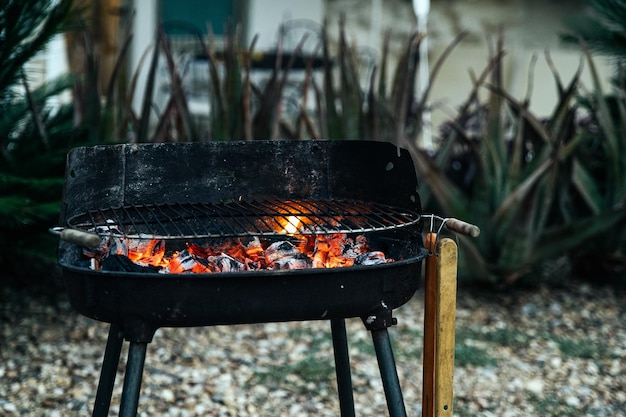Does food taste better on a charcoal grill?
Introduction
When it comes to grilling, there are numerous options available. However, one method that has stood the test of time and maintains a devoted following is grilling with charcoal. The distinctive flavor and aroma produced by a charcoal grill have made it a popular choice for many outdoor cooking enthusiasts. But does food really taste better when cooked on a charcoal grill? In this article, we will explore the reasons behind the appeal of charcoal grilling and examine the factors that contribute to its unique flavor profile.
The Charcoal Advantage
One of the key reasons why charcoal grills are favored by many is the ability to achieve high temperatures quickly. The intense heat generated by burning charcoal allows for a more efficient searing and caramelization process, which can enhance the flavors of meats, vegetables, and even fruits. This is especially noticeable when it comes to achieving perfectly charred steak or burgers with a delicious smoky flavor.
The Science Behind the Flavor
Charcoal grilling not only provides high heat but also imparts a distinct smoky flavor to the food. This flavor is derived from the combustion of the charcoal, which releases various compounds such as lignin and cellulose. These compounds interact with the food, creating aromatic compounds called volatile organic compounds (VOCs) that contribute to the overall taste experience.
Quote:
“The smoky flavor from a charcoal grill adds depth and complexity to the taste of food, creating a unique sensory experience.” – Grill Master Magazine
Control and Versatility
Another advantage of charcoal grilling is the level of control it offers. Unlike gas grills, where temperature control is typically achieved through adjusting burners, charcoal grills allow for greater precision. By manipulating the amount of charcoal and the airflow, grillers can create different cooking zones and adjust heat levels accordingly. This versatility opens up a world of possibilities for experimenting with various cooking techniques and achieving desired results.
A Matter of Preference
While there are undeniable benefits to cooking with charcoal, it ultimately comes down to personal preference. Some individuals enjoy the robust smoky flavor that charcoal grilling imparts, while others may prefer the convenience and consistent heat of gas grills. Factors such as the type of food being cooked, desired flavor profile, and overall grilling experience may influence one’s preference.
- Charcoal Grill Advantages:
- Intense heat for efficient searing
- Distinct smoky flavor
- Precise temperature control
- Opportunity for experimentation
- Gas Grill Advantages:
- Convenience and ease of use
- Consistent heat
- Quick startup and cleanup
- Less charcoal ash and smoke
Do Steaks Taste Better on Charcoal?
When it comes to grilling steaks, there’s an ongoing debate about whether charcoal or gas is the better option. Many avid grillers argue that cooking steaks on charcoal gives them a superior flavor and texture. Let’s explore the reasons why charcoal grilling is often considered the preferred method for achieving the perfect steak.
1. Flavor Enhancement:
Charcoal imparts a distinct smoky flavor that enhances the taste of the steak. The combustion of charcoal briquettes creates aromatic compounds, such as lignin and cellulose, which infuse the meat with a delicious smokiness. This unique flavor is difficult to replicate with gas grills.
2. High Heat and Even Cooking:
Charcoal grills are known for generating higher temperatures compared to gas grills. The intense heat sears the steak quickly, resulting in a caramelized crust while retaining the juiciness inside. Additionally, the radiant heat from the charcoal provides more even cooking, resulting in steak that is cooked to perfection throughout.
3. Versatility:
Charcoal grills offer greater versatility in terms of cooking techniques. You can use different types of charcoal, such as hardwood lump charcoal or flavored briquettes, to achieve various flavors. Additionally, you can add wood chips or chunks to the charcoal for a more pronounced smoky taste.
4. The Ritual:
Grilling on charcoal creates a unique experience that many enthusiasts appreciate. From lighting the coals to tending the fire, the ritualistic aspect of charcoal grilling adds to the overall enjoyment of cooking steaks. The process allows for more hands-on control and involvement compared to simply turning on a gas grill.
“Charcoal grilling provides a depth of flavor and authenticity that cannot be matched by other methods.”
In conclusion, while gas grills offer convenience and ease of use, many steak lovers argue that the taste and overall experience of grilling steaks on charcoal is unparalleled. The smoky flavor, high heat, versatile cooking options, and the ritualistic aspect all contribute to making steaks cooked on charcoal grills truly exceptional.
Why does meat taste better on charcoal?
For many food enthusiasts, there’s nothing quite like the flavor of meat cooked over charcoal. Whether it’s a juicy burger, succulent steak, or tender chicken, the smoky and distinct taste that charcoal imparts on meat is simply irresistible. But why does meat taste better on charcoal? Let’s explore the reasons behind this delicious phenomenon.
The Maillard Reaction
One of the main reasons meat tastes better on charcoal is due to the Maillard reaction. This chemical reaction occurs when proteins and sugars in the meat interact with the high heat of the charcoal. As a result, a complex series of chemical reactions take place, producing a range of flavorful compounds that give the meat its distinct taste and aroma.
Smoke Infusion
Charcoal grilling also allows for the infusion of smoky flavors into the meat. As the charcoal burns, it releases aromatic compounds that are then absorbed by the meat. These compounds add an extra layer of depth and complexity to the flavor profile, enhancing the overall taste experience.
Even Heat Distribution
Another advantage of cooking meat on charcoal is its ability to provide even heat distribution. Unlike other cooking methods, such as gas grilling, charcoal grills generate consistent and intense heat. This helps to sear the meat quickly, locking in the juices and creating a caramelized crust that seals in the flavor.
Quotes:
“The smoky flavor and perfectly charred exterior that charcoal grilling produces is difficult to replicate with any other cooking method.” – John, BBQ enthusiast
Table: Charcoal vs. Gas Grilling
| Aspect | Charcoal Grilling | Gas Grilling |
|---|---|---|
| Flavor | Intense smoky flavor | Milder taste, lacking smokiness |
| Heat Distribution | Even heat distribution | Inconsistent heat distribution |
| Char and Crust | Creates deep char and flavorful crust | Less charring and crust formation |
To fully experience the mouthwatering taste of meat cooked on charcoal, consider trying out different grilling techniques, using marinades and rubs to enhance the flavors, and experimenting with different types of charcoal for additional smokiness. So fire up that grill, grab your favorite cut of meat, and enjoy the unmatched taste of charcoal-grilled goodness!
Are Ribs Better on Gas or Charcoal Grill?
Grilling ribs is a quintessential part of the summer barbecue season. While there are many ways to cook ribs, a common debate among grill enthusiasts is whether ribs are better cooked on a gas or charcoal grill. Let’s explore the pros and cons of each method to help you decide which one suits your preferences.
Gas Grill
A gas grill offers convenience and control over temperature, making it an attractive option for many grillers. With gas grills, you can easily adjust the heat and maintain a consistent temperature throughout the cooking process. This is particularly important when it comes to ribs, as they require slow and even cooking to achieve that fall-off-the-bone tenderness.
Pros of cooking ribs on a gas grill:
- Easy temperature control
- Convenience and quick start-up time
- Less smoke production
Cons of cooking ribs on a gas grill:
- Less smoky flavor compared to charcoal grilling
- May lack the charred crust that charcoal grilling offers
Charcoal Grill
Charcoal grilling, on the other hand, brings out the traditional smoky flavor that many barbecue enthusiasts love. The charcoal briquettes create intense heat and produce smoke, which infuses the ribs with a distinct flavor profile. Additionally, the high heat from the charcoal can create a desirable charred crust on the ribs.
Pros of cooking ribs on a charcoal grill:
- Enhanced smoky flavor
- Potential for a charred and crispy exterior
- Cooking over an open flame can add an extra layer of flavor
Cons of cooking ribs on a charcoal grill:
- Less temperature control compared to gas grills
- Requires more effort to light and maintain the fire
- Charcoal grilling may produce more smoke, which could be an inconvenience for some
Ultimately, the choice between a gas or charcoal grill for cooking ribs comes down to personal preference. If convenience and precise temperature control are important to you, a gas grill might be the best option. However, if you crave that classic smoky flavor and don’t mind putting in a bit more effort, a charcoal grill could be the way to go.
Whichever type of grill you choose, remember that the key to delicious ribs lies in the cooking technique, seasoning, and overall attention to detail. Happy grilling!


